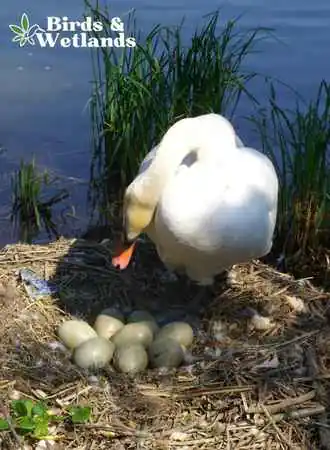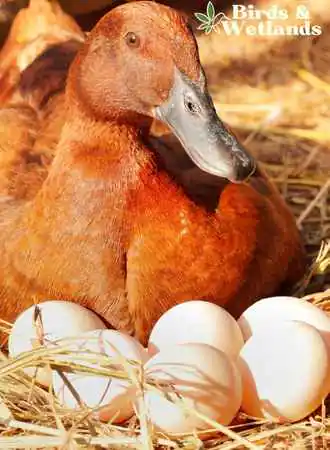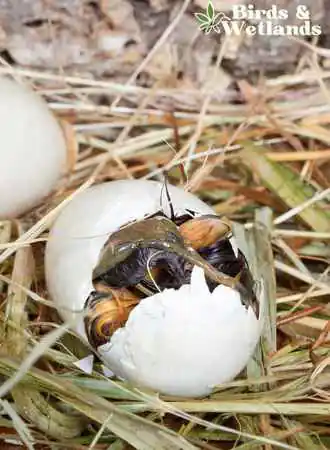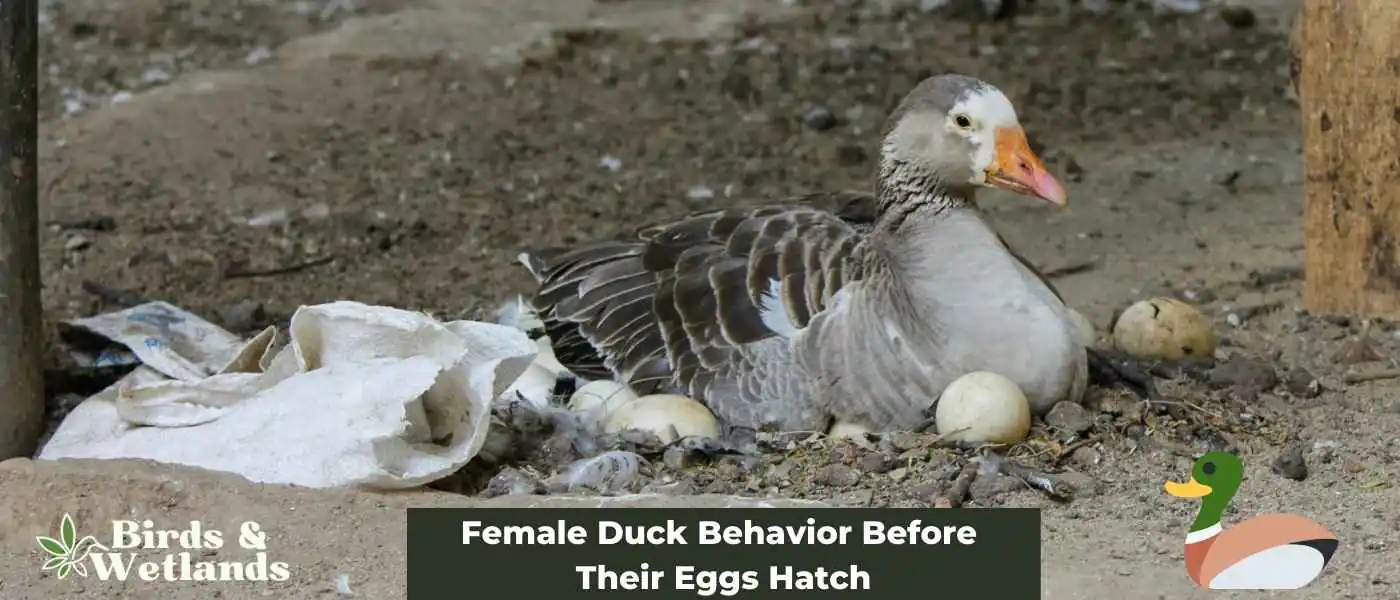It’s fascinating to observe the behavior of a female duck before her eggs hatch. While many people believe that all ducks are the same, it turns out that different types of ducks behave differently when they are expecting eggs.

Before their eggs hatch, female ducks, also known as hens, exhibit distinctive behaviors indicative of their nesting and brooding periods. They select and prepare a safe nesting site, often hidden and close to water. Once the eggs are laid, hens spend most of their time incubating the eggs, which includes sitting on the nest to regulate the eggs’ temperature and turning the eggs periodically to ensure even development. During this period, the hen will leave the nest only briefly to eat and drink. As the hatching time approaches, the female duck may become more vigilant and protective of her nest.
Key Takeaways on Duck Mothers’ Behavior
- Female ducks initiate mating, and this is often shown by flapping wings, quacking, and shaking their beaks more rapidly. This behavior typically begins 6-7 months after the ducks hatch.
- A duck’s behavior becomes calmer when she is ready to lay eggs. Ducks usually lay eggs early in the morning in hidden areas. Duck mothers lay one egg a day. An easy way to tell if a duck is ready to lay eggs is by examining her pelvic bones, which become more spread out and flexible.
- During egg incubation, a duck becomes quiet and can be aggressive if disturbed, particularly when she’s protecting her eggs or searching for food. Providing feed and water near her incubation spot can help reduce the distance she needs to travel.
- In the final days of incubation (25-28 days), the mother duck’s behavior changes. She becomes less aggressive, spends more time with her eggs, and prepares for the ducklings to imprint on her when they hatch.
What Do Ducks Do Before Their Eggs Hatch?
Egg-laying females have strong maternal instincts, clearly visible during the nesting season. After successfully mating, they will spend significant time feeding before laying eggs to ensure they are healthy and well-nourished.
Hens will pluck their feathers around the brood patch or bare spot on their bellies, where blood vessels run close to their skin, to help keep the eggs warm and provide oxygen to developing embryos. The pelvic bones of the female will spread and become more flexible as an indication that she is ready to lay her eggs.
Ducks will remain carefully perched on the nest after laying their eggs, often at risk of injury or even death if disturbed. During this time, they fiercely defend their nests from predators, using loud calls and aggressive movements to scare them away.
Do Ducks Make Noise Before Hatching?
Given the wealth of information available on duck vocalizations, it is clear that they do make noise before hatching. The primary function of these vocalizations appears to be twofold: first, they help synchronize hatching and allow the young to coordinate their movements as they emerge from the eggs, and second, they may serve an imprinting function by triggering maternal behavior in the mother.
A female duck begins to hear tentative peeping sounds from within her eggs after approximately 3 to 24 hours of incubating her clutch of eggs. The chicks’ feeble cries become louder and more insistent as they continue to vocalize and break free from their shells until the hatchlings can burst free and dry off in hours.
When every egg hatches, the mother duck will raise all of the ducklings.
How Do Ducks Act During Incubation?

Female ducks work hard to provide warmth to their eggs. They spend most of their time carefully sitting on their eggs, using their own body heat to aid in developing vital tissues and organs within the shells.
Furthermore, mature ducks tend to pluck out their feathers during this period to keep themselves from becoming too hot or cold while sitting on their eggs. Embryos need a certain amount of heat to develop inside the eggs. Because of this, mother ducks adjust how often their brood patch comes in contact with their eggs and the amount of time spent on the nest.
During the entire incubation period, the male duck or drake will stand guard near her mate and watch for predators and other threats as she take breaks to eat food and sleeps at night.
When the ducklings hatch, their determined mothers will fiercely defend them against any perceived threat, whether a predator or a curious passerby. For instance, the hen will flap its wings furiously and will begin hissing.
FAQs on Incubating and Hatching Ducklings
Do Ducklings Have an Egg Tooth?
Just like young chickens, ducklings and other young waterfowl do have an egg tooth, though it isn’t a tooth. Rather, a small bump on the end of the bill aids the young duck in breaking through its shell during hatching. The tooth serves as an “opening aid,” allowing the young bird to break free from its protective casing and begin its journey into the world.
Do All Duck Eggs Hatch at the Same Time?

Duck eggs do not hatch all at once. Their eggs are laid over time, usually several hours to several days apart.
While some eggs may hatch within a few days of each other, others may take longer to hatch, allowing ducklings born on different days to catch up.
Your own ducks use this strategy to their advantage — having hatched at different times means they aren’t competing with their littermates for food or space, increasing the chances of survival for each duckling.
Once all the ducklings have hatched, the mother will help warm and dry her newly-hatched ducklings.
Can a Mother Duck Raise Ducklings From Another Mother?
Many people believe that a mother duck can only raise her ducklings, but this is not true. In fact, a mother duck can foster young ducklings from other ducks. You’ll need to find a foster mother with other ducklings the same size as the baby ducks in need.
If the ducklings are domestic, it may be possible to find another domestic duck, as these birds are often more willing to foster other species. Even if the young ducks are wild, a female domestic duck can raise them. Wild female ducks, on the other hand, will not raise domestic ducklings. For instance, a wild Mallard can’t take care the brood of a domestic Mallard.
How Do You Know When Duck Eggs Are About to Hatch?

Timing is everything when it comes to hatching eggs. For the best possible outcome, it is critical to understand the key developmental milestones and signs to look for when your eggs are about to hatch.
On day 14, you can start candling your eggs to see how things are progressing inside. You can see the embryo developing inside the shell as you shine a light through it. The air sac in the egg’s blunt end will also expand, indicating that the duckling will soon break free from its shell.
By keeping an eye on these key development indicators, you can avoid problems and give your ducklings the best chance of emerging healthy and strong from their shells.
What Time of Day Do Ducks Lay Eggs?
Ducks typically lay their eggs in the early morning when the sun is just rising. This adaptation allows ducks to incubate the eggs during cooler parts of the day while keeping them safe from predators in dark or dimly lit environments.


